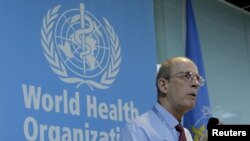China needs to more closely regulate the market for private vaccines within its borders, the World Health Organization said Tuesday after authorities broke up a massive illegal drug ring earlier this month.
Police in China arrested more than 130 people allegedly involved in the illegal drug trade after the group dumped around $48 million worth of illegal vaccines onto the private Chinese drug market. Much of the medicine had expired before it was sold.
“This incident has highlighted the need for more, stricter enforcement of vaccine management regulations across the board,” WHO China representative Bernhard Schwartlander said in an email.
According to Chinese police, a woman and her daughter, who have since been arrested, led the drug ring and sold more than $100 million worth of illegal vaccines across the country since 2001.
Private sellers
All told, 29 pharmaceutical companies are believed to have sold the illegitimate drugs to 16 institutions.
Vaccines for diseases like polio and measles are required for all children in China, and are provided by the state, but other vaccines, such as those for meningitis and rotavirus, are provided by private sellers. According to the WHO, regulatory loopholes have caused tens of millions of dollars’ worth of illicit drugs to make their way to the country’s children.
“The vaccines that are in the private sector need to be managed, stored, handled, distributed and used in accordance with recognized standards,” Lance Rodewald, a WHO immunization expert said during a briefing.
Rodenwald said China’s public vaccination system is safe and that the illegal vaccines, while ineffective against disease, do not pose a risk to children who received them.
“Parents should be comfortable knowing that their child will not have a toxic reaction,” but some children will likely need to receive another vaccination, he said.




